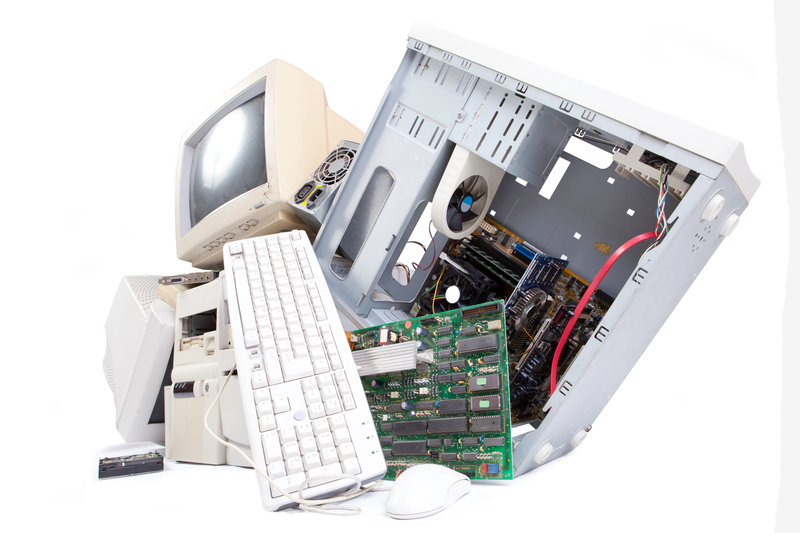Guide to Proper Disposal Locations for Old Chargers
In today's digital age, chargers are everywhere. As technology evolves, it's common to end up with a drawer full of unused, broken, or outdated chargers for smartphones, tablets, or laptops. While it might be tempting to throw these items into the trash, improper disposal can harm both the environment and human health. This comprehensive guide will explore the best proper disposal locations for old chargers, offering you eco-friendly, effective, and convenient solutions.

Why Proper Charger Disposal Matters
Before finding the right disposal method, let's understand why responsible disposal of old chargers is crucial:
- Environmental Protection: Chargers contain metals and electronic components that can leak toxins into the soil and water if left in landfills.
- Resource Conservation: Many charger components can be recycled and repurposed for new products, reducing the need for raw materials.
- Safe Waste Management: Some chargers may contain hazardous materials. Proper disposal helps prevent fires or harmful chemical exposure.
- Legal Requirements: Many regions have regulations against dumping electronics in general waste.
Proper disposal locations for old chargers are not just a matter of convenience--they're a responsibility to ourselves and future generations.
Understanding the Composition of Chargers
Before disposing of your unused chargers, it helps to know what they're made of:
- Plastic Shells: Most chargers have durable plastic casings, which are non-biodegradable.
- Metal Components: Chargers consist of copper, aluminum, and other metals commonly used in circuit boards and connectors.
- Circuit Boards: These contain precious metals and sometimes trace hazardous materials.
- Wires and Cables: Usually made from copper with plastic insulation.
Because chargers contain a mixture of reusable and hazardous materials, disposing chargers in landfill is never recommended.
Best Disposal Locations for Old Chargers
When it comes to responsible ways to dispose of old chargers, the goal is to recycle or repurpose as much material as possible. Below are the top disposal options you should consider.
1. E-Waste Recycling Centers
Electronic waste recycling centers are specialized facilities equipped to handle old chargers and other electronic devices. They disassemble chargers, sort the various components, and process materials for reuse.
- How to Find One: Search online for "e-waste recycling center near me" with your zip code or city. Websites like Earth911 (earth911.com) provide location databases.
- Process: Most centers accept walk-ins and offer drop-off bins specifically for cell phone chargers, laptop adapters, and USB cables.
- What They Accept: Chargers, cables, batteries, and other small electronic accessories.
- Benefits: These centers ensure maximum recovery of both metals and plastics, keeping hazardous materials out of landfills.
2. Retailer Take-Back Programs
Many big-box retailers and electronics chains now accept old chargers for recycling thanks to extended producer responsibility laws and eco-conscious policies. Notable brands and stores include:
- Best Buy: Has a comprehensive electronics recycling program. Drop bins are often available at the store entrance.
- Staples: Accepts cables, chargers, and similar peripherals for recycling at all U.S. locations.
- Apple Stores: Accepts any brand of charger or cable regardless of whether the original device was bought there.
- Target, Home Depot, and Lowe's: Some locations offer small electronics drop-off bins.
It's a good idea to call ahead or check the store's website for up-to-date recycling policies and to confirm they accept chargers.
3. Municipal Household Hazardous Waste Programs
Across the U.S. and many other countries, local government programs are set up to handle electronics recycling as part of household hazardous waste collection. These services are typically free for residents.
- How to Participate: Contact your city's department of public works or visit its website. Look for e-waste event schedules or permanent drop-off locations.
- Accepted Items: Most programs accept chargers, cables, electronics, small appliances, and sometimes batteries.
- Documentation: You may need proof of local residency. Some programs limit the number of items per person per year.
4. Manufacturer Mail-Back Initiatives
Forward-thinking manufacturers offer mail-in recycling programs for their products:
- Dell Reconnect: Dell, in partnership with Goodwill, accepts all brands' cables, chargers, and peripherals.
- HP Planet Partners: Provides free return shipping labels for recycling old electronics.
- Apple Recycling: Allows users to mail in any Apple-branded accessory for recycling.
Check your device or accessory manufacturer's website for details and instructions on how to mail back old chargers.
5. Community Recycling Events
Many towns hold annual or semi-annual community e-waste collection events. These events often accept old chargers along with a wide variety of electronics. Some may even offer incentives such as gift cards or discounts in exchange for recycling.
To find local events, check community bulletin boards, your city's official website, or social media pages.
6. Charitable Donations and Reuse
If your charger is functional and in usable condition, consider donating old chargers to:
- Schools and Nonprofits: Many need chargers for donated devices.
- Secondhand Stores: Organizations such as Goodwill or Salvation Army accept functional chargers and resell them to benefit their programs.
- Local Tech Drives: Some areas run drives for underserved students or communities in need of electronics.
Always make sure the charger is compatible and safe before donating.
What Not To Do: Improper Disposal Risks
Dumping chargers in the trash or conventional recycling bins is not only unsafe--it can also be illegal in some areas. Here's why you should never throw old chargers in your regular trash:
- Toxic Leaching: Metals and certain chemicals can seep into the soil and water supply.
- Fire Hazard: Damaged or crushed chargers (with batteries) can spark fires in landfills or collection trucks.
- Lost Resources: Materials that could be recycled instead pollute the environment.
- Fines and Penalties: Many states, counties, or countries fine improper disposal of electronic waste.
How to Prepare Chargers for Disposal
Before dropping your items at a disposal location for old chargers, take these steps:
- Sort: Gather all unwanted chargers, cables, adapters, and accessories you plan to dispose of.
- Inspect: Check for damage. Do not donate chargers with exposed wires or broken plugs.
- Organize: Bundle similar items using rubber bands or reusable ties; this helps recycling staff sort and process your items efficiently.
- Secure Personal Data: If your charger is attached to a smart accessory (such as a smart cable with storage or device), make sure to wipe or reset it.
- Bag Before Drop-off: Put the chargers in a zip bag or small paper bag to prevent tangling and loss in collection bins.
Frequently Asked Questions about Charger Disposal
Can I put old chargers in my curbside recycling bin?
No. Most municipal curbside recycling programs do not accept electronic accessories, including chargers and cables. They require specialized sorting and processing to recover valuable materials and safely dispose of hazardous elements.
What happens to chargers when they're recycled?
At e-waste recycling centers, chargers are disassembled, and the metals, plastics, and circuit boards are separated. Plastics are processed for reuse, while metals like copper are melted down and used in reused or new electronic devices.
Is it safe to donate chargers for reuse?
You should only donate chargers that are safe, intact, and functional. Frayed, exposed, or broken chargers present a fire and shock risk and should be recycled instead.
How do I find my nearest charger recycling location?
Try these methods:
- Use the Earth911 locator (U.S.).
- Check your city or state government website.
- Call electronics retailers or visit their recycling program web pages.
- Contact your waste management provider; they often know local drop-off points for electronics.
Special Notes for Other Regions (UK, EU, Canada, Australia, etc.)
Disposal options may differ internationally:
- United Kingdom: Look for "WEEE" recycling collections in stores or civic amenity sites.
- European Union: Member states are required by law to provide electronic waste recycling drop-offs through local authorities and retailers.
- Canada: Most provinces have electronic recycling programs where old chargers can be dropped off at depots.
- Australia: TechCollect and MobileMuster programs offer drop-off locations for unwanted chargers and electronics.
Check your local council's website for region-specific instructions and updates.

Alternatives to Disposal: Reuse and Repurpose
If your charger still functions, consider creative ways to prolong its life:
- Keep as a Spare: Leave a second charger at work or in your car.
- Gift to Friends or Family: Someone may need a backup charger for travel or emergencies.
- Repurpose Parts: Tech-savvy individuals can use wires and connectors for DIY electronics projects.
- Donate to Local Makerspaces: Community workshops often accept old chargers for parts and learning projects.
Summary: Making Environmental Impact with Responsible Charger Disposal
Conscientiously disposing of old chargers means you're doing your part to protect the earth, conserve valuable resources, and reduce electronic waste. With numerous recycling programs and convenient drop-off options, there's no excuse to let old chargers gather dust or pollute the environment. Use a local e-waste recycling center, retailer take-back program, municipal waste program, or manufacturer mail-in option to handle your chargers the right way.
Remember: Proper disposal of your old chargers benefits you, your community, and the planet. Start implementing these simple steps today for a cleaner, greener tomorrow.
Additional Resources
- EPA - Electronics Donation and Recycling
- Call2Recycle (for rechargeable batteries and some chargers)
- Recycle Now (UK)
- Recycle My Electronics (Canada)
By following this comprehensive guide to proper disposal locations for old chargers, you can easily keep harmful electronics out of landfills and contribute to a circular economy.